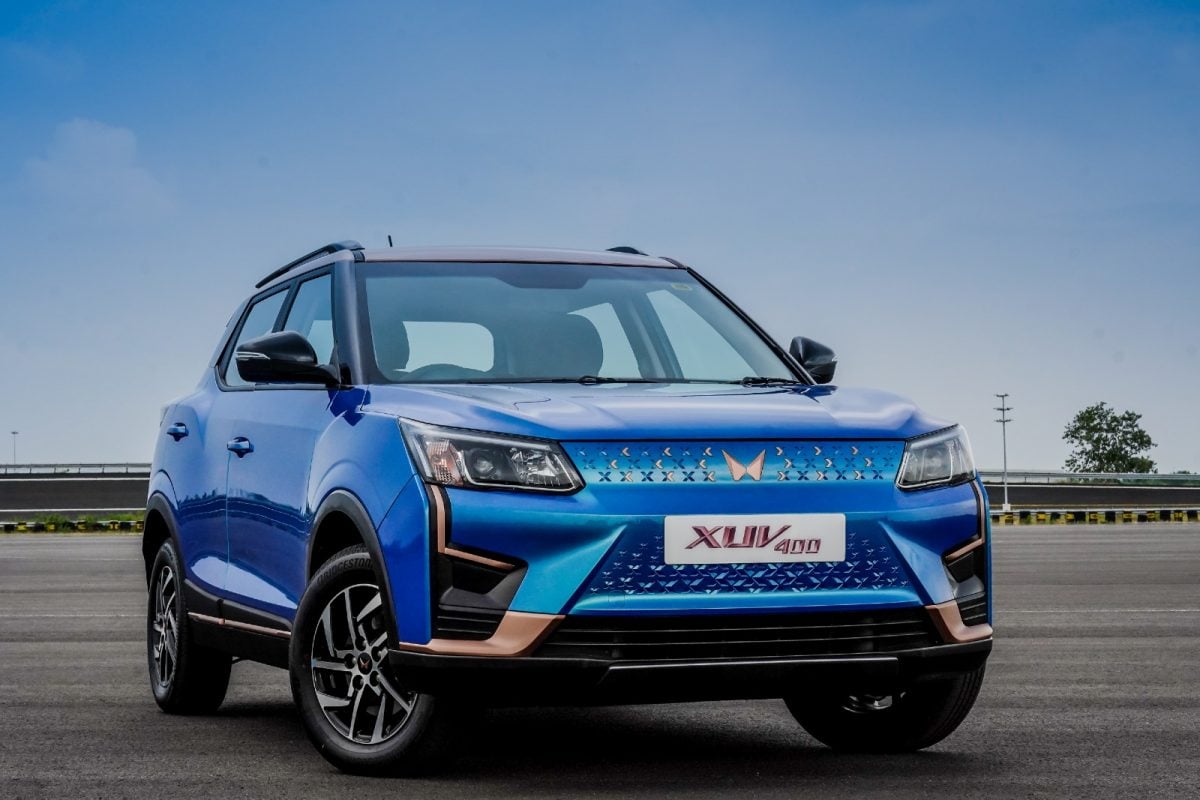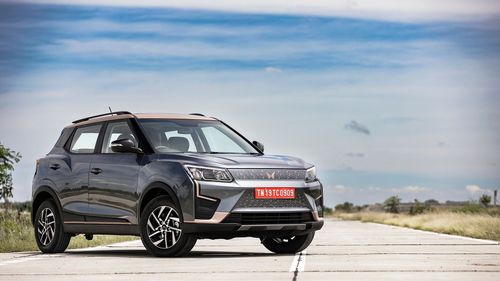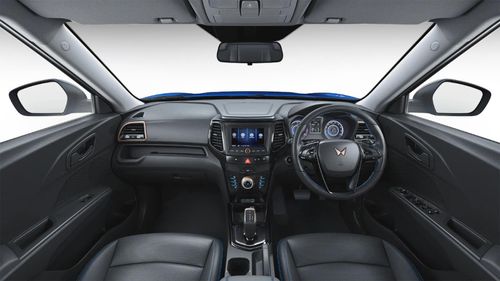Mahindra XUV 400 e-SUV Detailed Review & Analysis
By Sachit Bhat

3118 Views
Mahindra has revealed the XUV400 electric SUV, which is based on the XUV300 subcompact SUV, less than a month after announcing 5 SUVs that will be released over the next 4 years as part of its born-electric strategy. On the outskirts of Chennai, at the ma
Mahindra has revealed the XUV400 electric SUV, which is based on the XUV300 subcompact SUV, less than a month after announcing 5 SUVs that will be released over the next 4 years as part of its born-electric strategy.
Mahindra & Mahindra is brimming with enthusiasm. The carmaker has presented the XUV400, a vehicle that was originally shown at the Auto Expo 2020 in concept form and will be released over the following four years, less than a month after announcing 5 SUVs that will be marketed as part of its born-electric plan. In a way, the forthcoming SUV is a larger, electric version of the XUV300 subcompact SUV.
Design Elements of XUV 400 electric SUV

The front of the XUV 400 is very different from that of the XUV300. Since there isn't an engine in this place, a grille is unnecessary. As a result, the slick copper colour has been widely employed on the aero-fascia with aerohead inserts. Even the twin peaks logo, which can be seen on the bumper, profile, rear, and roof, is completed in slick copper. In order to give this electric automobile a unique personality, Mahindra is adopting this colour. Remember that copper is a good conductor of electricity as well. The SUV has thin LED projector headlamps with a recognisable DRL pattern.
Massive, circular wheel arches look well from the profile and accentuate the attractive 16-inch alloy wheels superbly. There are several SUV elements in this design, like the charging socket being located on the passenger-side fender and the presence of body cladding and roof rails on the profile. The new LED tail lamps on the back are the focal point and help set this vehicle apart from the XUV300. There are a total of 5 colour choices, and we got to try the Galaxy Grey. Any colour, whether in monotone or with a shiny copper roof, is available. The automobile does, in general, appear to be large; in fact, it is larger than any of the current compact electric SUVs available for purchase in India. The XUV 300 appears to have expanded significantly only by looking at the silhouette, with a length of 4200 mm and a wheelbase of 2,600 mm being two notable measurements.
Tech & Interiors of XUV 400 Electric SUV

Although the colours utilised are different because the entire cabin is coated in black, it has a similar appearance to the XUV300. The cabin is made more appealing by the blue stitching on the chairs. The instrument cluster has both analogue and digital components, and the unusual-looking rpm metre shows you how the electric drivetrain is operating—whether it is boosting power or charging the batteries while the vehicle is moving. The car comes with a wired 8-inch touch screen infotainment system that supports Apple CarPlay and Android Auto. The Mahindra Bluesense+ connectivity suite, which has more than 60 capabilities, is also included with the system. The cabin receives high marks for ergonomics thanks to its ample storage space on both rows.
However, it appears Mahindra did make a mistake by not updating and enhancing this cabin's features. A somewhat smaller screen as well as the absence of a complete digital cluster may not be something that the modern customer is particularly fond of. The sunroof makes the inside feel airier, and the second row is undoubtedly roomier than it was in the XUV300 thanks to the longer body. There are no air conditioning vents or a 3-point seat belt for the passenger in the middle seat, however there is a centre armrest. A 60:40 split seat option is available for the second-row seat to increase usability. The larger cargo capacity offered by this car is another benefit of its greater length. The XUV400 has 378 litres of trunk space, and 418 litres if measured to the roof.
Dynamics of XUV 400 Electric SUV
The 39.4 kWh Li battery pack that powers the XUV400 may not seem like much, but the stats are pretty amazing. You get a maximum power output of 148 horsepower and a maximum torque output of 310 Nm. The crucial range number comes next, of course. According to Mahindra, the ARAI tested figure is 456 kilometres, which is a bit less than the MG ZS EV and a little more than the Nexon EV Max (437 kilometres) (461 km).
We now understand that the best feature of electric vehicles is that you have access to all of the torque right away. Therefore, you may start using entire 310 Nm as early as 25 rpm. This car is fast because it can reach 60 kph in only 4 seconds and 100 kph in just 8.3 seconds. The vehicle's top speed is 150 kph.
This SUV has several drive settings with various levels of regeneration; they are referred to as fun, fast, and courageous. So, you can choose your driving mode based on the remaining range and how much more you desire from this configuration. The most enjoyable driving experience on this automobile is in the fearless mode, even though enjoyment is actually a little more subdued. Then there is another option, referred to as energetic, where single pedal driving is enabled. In order to gain a slightly higher range on this car when you run out of range, you will need to go a little bit farther. Apart from regen levels, according to Mahindra, changing driving modes can adjust how responsive the steering and throttle are. The automobile feels the lightest and most energising in Fearless mode. But when you use a vehicle in this mode, the batteries deplete more quickly.
Ride & Handling
Mahindra claims that although the floor has been altered because of the batteries, the rear suspension has not changed from the XUV300. We had no issues with the ride quality on the 300, and the same is true of the 400; the car offers a comfortable drive at both low and high speeds. This adjustment hasn't had an impact on handling either. While driving on the banks of MSPT's high-speed test track, you don't really complain about the handling nature of this automobile because it is a tall but also quite wide vehicle.
The car incorporates frequency dependent dampening, which guarantees a greater ride experience. The theory is that the battery's inertia shouldn't magnify the vibrations from the road. Thankfully, this cabin has a lot of barriers preventing noises or vibrations from the outside from entering. The SUV has 190 mm of ground clearance, which will let it navigate rough roads with ease.
What are the Safety options available in XUV400 eSUV?
The XUV400 has up to 6 airbags, much like the XUV300. Disc brakes are also installed on the car's four wheels. According to Mahindra, the automobile crash-compliant structure was made possible by the widespread usage of high strength steel. It will be fascinating to watch how this electric SUV does in terms of crash test ratings since we already know that the XUV300 is one of the safest vehicles in India. The motor and battery pack of the automobile also receive IP67-rated ingress protection. What kind of guarantee would be provided on the battery pack has still not been made public by Mahindra.
Charging
This car can be charged in 6.5 hours using a 7 kW AC charger, however it will take a full 13 hours using a 16-ampere outlet at home. Then there is the rapid-charging option, where you can charge the automobile from 0 to 80 percent in about 50 minutes using a 50 kW DC fast charger. To make it simpler for customers to refuel their automobiles, Mahindra claims that moving forward, it would have partnerships with various partners for all types of charging choices.
What is the price of XUV 400 eSUV?
The SUV will go on sale in January of the following year, with deliveries starting later this month. The XUV400 could be released at a starting price of Rs 18 lakh (ex-showroom), based on the costs of its primary competitors, including the MG ZS EV and Tata Nexon EV Max. A competitive price will undoubtedly aid in overcome some drawbacks, such as a cabin that doesn't feel very modern or feature-rich.